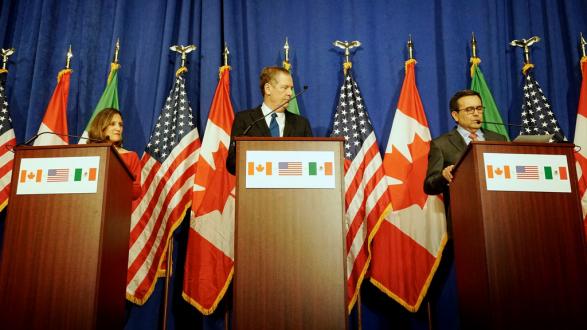Once a stage for promising musicians and filmmakers, South by Southwest has now become the place to engage with innovators, artists and thought leaders of all kinds. It is one of the preeminent places to discuss not only the cutting edge of art, music, film, technology and public policy, but also, and most importantly, the disruptions that these will have on the economic and societal pulse of our country and the world.
No other current public policy development could cause greater disruption for those of us rooted in the U.S.-Mexico relationship than renegotiating or even withdrawing from the North American Free Trade Agreement. For example, the Paso del Norte region, where the states of Texas, New Mexico and Chihuahua converge to form the heart of the U.S.-Mexico border, has been critically important to and aligned its economy to support the vitality and resilience of both NAFTA and global trade.
The principal cities of this region, El Paso, Juárez, Las Cruces and Albuquerque, with their industrial output, border crossings, and rail and interstate networks, have formed the backbone of North American and international logistics and supply chains, stretching from East Asia to Central Mexico and the Atlantic and Gulf Coasts. As trade has expanded between the U.S., Mexico and Canada, so has the prosperity and economic development of the region.
The renegotiation of NAFTA presents a series of disruptive challenges and opportunities for the Paso del Norte region.
The renegotiation of NAFTA, then, presents a series of disruptive challenges and opportunities for the Paso del Norte. In addition to restructuring traditional industrial rules of origin, a new NAFTA will certainly address the digital economy. What impact will provisions on data flows, intellectual property, automation and cyber security have on the U.S. and Mexico? How will it impact the border and the Paso del Norte regions?
This past weekend at SXSW, the Mexican Consulate in Austin, at its annual Casa Mexico venue, brought together leading thinkers in both countries to discuss these very questions. There, Paulo Carreño of ProMexico, Alejandro Delgado of the Instituto Nacional del Emprendedor, Republican U.S. Rep. Will Hurd, Kate Sheerin of Google and I were able to share our thoughts regarding the history and current state of NAFTA and the looming impact of new digital commerce provisions.
The panelists noted how NAFTA, in 1994, was an unprecedented and legally innovative document, and that our three countries now have another opportunity to lead the world again with its modernization to capture the importance and value of the digital economy. At the same time, the importance of including perspectives, voices and input from all communities, particularly those along the border, also was emphasized. Indeed, how will automation impact the maquilas? Or driverless trailers impact the logistics industry? How will these disruptions impact the economic stability of the Paso del Norte, or, more importantly, the security of both the U.S. and Mexico?
With leading regional and binational resources like the Hunt Institute, the NAFTA countries will be able to not only survive, but thrive, in the face of any challenges or disruptions to the North American partnership.
The work of the Hunt Institute for Global Competitiveness at the University of Texas at El Paso is dedicated to answering these questions. The institute maps out the composition of trade, labor, banking, energy and supply chains that cross through the Paso del Norte border region. By leveraging the resources of the institute, public policymakers—such as those negotiating NAFTA—can now see the data and structure of the economies of West Texas, New Mexico and Chihuahua, and craft provisions that can be of benefit both to these communities and the broader NAFTA partners simultaneously. Moreover, and perhaps most critically, the institute also serves as a platform for local, state and regional stakeholders to learn about these potential changes to NAFTA and the opportunities they would bring.
With a forum and discussion like the one hosted by the Mexican Consulate in Austin at SXSW, and with leading regional and binational resources like the Hunt Institute, the NAFTA countries, as well as the Paso del Norte region, will be able to not only survive, but thrive, in the face of any challenges or disruptions to the North American partnership.
_____________________
Patrick Schaefer is a Pacific Council member and executive director of the Hunt Institute for Global Competitiveness.
This article was originally published by El Paso Times.
The views and opinions expressed here are those of the author and do not necessarily reflect the official policy or position of the Pacific Council.




